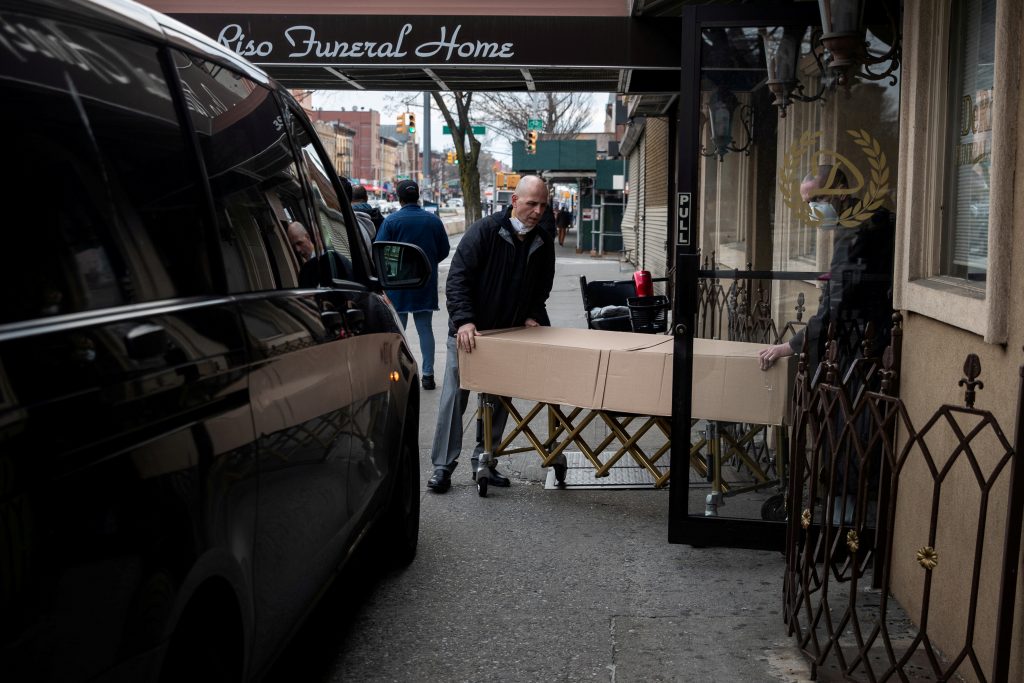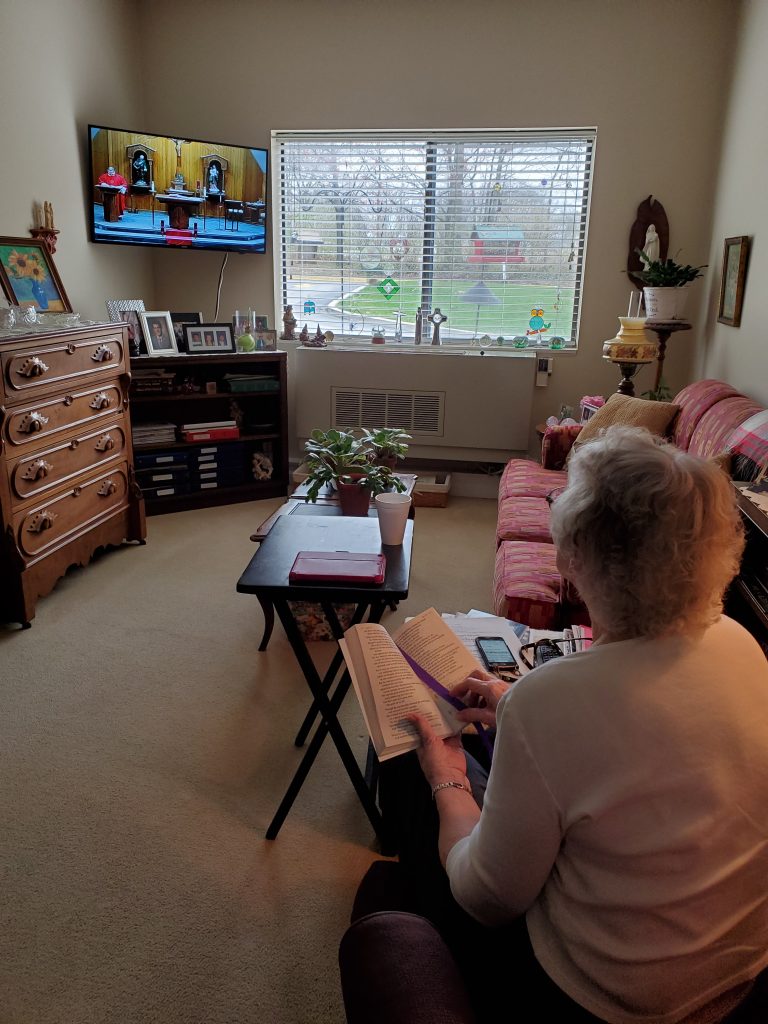April 14, 2020 // Diocese
Works of mercy lived by many during pandemic
All human lives have dignity, according to Catholic teaching, even in the midst of a crisis situation, and they are deserving of respect. Catholic service organizations practice both corporal and spiritual works of mercy by visiting the sick, comforting the afflicted, praying for the living and the dead, and burying the dead. All of these must be done regardless of the state of the world.
While COVID-19 has limited person-to-person interaction, the call to live the works of mercy has only intensified in areas of care such as medical, assisted living and funeral services.

Men in New York City carry a body into a funeral home April 5, 2020, during the coronavirus pandemic. About 10,000 people have died in the U.S. because of the virus. (CNS photo/Jeenah Moon, Reuters)
Certain needs cannot be rescheduled or put aside. Divine Mercy Funeral Home in Fort Wayne continues to hold funeral services for families who have lost loved ones, keeping safety as a main priority. Executive Director Casey Miller said, “We are trying to maintain the Catholic aspects” of Catholic funerals, “such as the rosary and vigil” while following safety protocols. For the foreseeable future, Divine Mercy is only allowing 10 people in the visiting room at a time and has asked that visitations be limited to family only.
“Families have been beautiful and very understanding,” Miller said. He shared that in general, visitation attendance has decreased exponentially as people also follow the social distancing guidelines of their own accord. Even when Divine Mercy hosts a larger family gathering, the staff is still able to maintain those guidelines by utilizing the entire facility. “Funerals are social things,” Miller shared. “When we have a funeral, we give the family the entire home.” This includes use of the visitation room plus a family room and other gathering spaces, as well as the lobby.
The funeral home also has many pieces of artwork on loan from Father Phillip Widmann, curator of the Diocesan Museum, which family members can view and enjoy. Miller explained that the collection encourages people to move around the home, rather than remaining in the visitation room. If the 10-person capacity is reached, staff have been directed to ask mourners to wait until others leave and will then escort them in.
Priests from the Diocese of Fort Wayne-South Bend have been coming to Divine Mercy to say the rosary with families and even celebrating funeral Masses at the person’s parish if safety measures are met. In filling their mission of burying the dead in a respectful manner, at Divine Mercy the use of graveside tents has been discontinued, as it encourages people to gather together rather than to maintain distance. Families are also offered the opportunity to return at a safer time for a larger memorial service. “We will do that gladly,” Miller stated.
The funeral home also has the capability to stream the rosary so that other mourners can join their prayers to the family’s, though Miller said that no one has asked for that service yet. Intense cleaning and staggered worker schedules, along with automatic doors on the building, all contribute to Divine Mercy’s efforts to help prevent the spread of the virus while serving the grieving.
St. Joseph Hospital in Mishawaka is blazing new trails when it comes to caring for the physical and spiritual well-being of patients, both those in isolation and in regular care. “This is a ministry — it’s a Catholic ministry,” said Sister Carole Langhauser, PHJC, director of mission integration.
While the health and well-being of patients is a high priority, St. Joseph staff members have not neglected their spiritual needs. Sister Carole stated that St. Joseph has chaplains on duty 24 hours a day, who are busy “meeting the needs of patients, employees and families (by phone).”
She is proud to share how the chaplains have been working hard to care for those in need. “Trying to be calmness in the storm is a calling to us. The chaplains are doing a wonderful job. They’re becoming family to the patients. It’s edifying.”
If the need arises, Catholic chaplains are able to bring Communion and the anointing of the sick to patients, though using proper procedures for those in isolation is sometimes tricky. Nursing staff help the chaplains “suit up” properly, and both are willing to provide this service. One chaplain has begun a podcast, and the hospital has some technology devices such as iPads that can be used to bring Mass podcasts to Catholic patients in isolation who would like to make use of this service.
Patients are not the only ones in need. Measures are taken to care for staff members, too, ensuring their physical, emotional and spiritual health. Sister Carole called these workers “superstars” — hospital staff who are “going beyond the job description” to aid others. She said that many of these doctors, nurses and others work long hours and have made connections outside the hospital to meet their needs.
The community has jumped in to help, with some restaurants providing food for staff. Hotels have offered free stays and many people have volunteered to make masks. Monetary donations to the foundation have also increased.
For elderly people in residential care, one of the biggest sacrifices is not being able to visit with loved ones. Saint Anne Communities in Fort Wayne and Huntington is finding ways to keep residents’ spirits high in the middle of this time of sacrifice. “It’s definitely very difficult for our residents,” said Annie Budenz, admission and marketing director for Saint Anne Communities. The staff has been working hard to care for residents while following guidelines set out by the Centers for Disease Control and Prevention and the state of Indiana for their protection.
In lieu of large gatherings of residents, the staff has been working one-on-one with them — helping them write letters, send pictures and arrange FaceTime and video chats with loved ones. One staff member has been making Easter Bunny visits to residents. “We’re doing anything little to get smiles from them and keep their minds busy.”
Budenz said that they have had instances of family members “visiting” relatives’ windows. Within the local area, people outside Saint Anne have been making cards and cloth masks for residents, which have been greatly appreciated. Saint Anne has a Catholic chaplain who lives in the building to help see to the spiritual care of the residents.
The Catechism of the Catholic Church defines the works of mercy as “charitable actions by which we come to the aid of our neighbor in his spiritual and bodily necessities.” The Catholic service organizations within the Diocese of Fort Wayne-South Bend are living the example of these works of mercy during an incredibly difficult time.
The best news. Delivered to your inbox.
Subscribe to our mailing list today.








